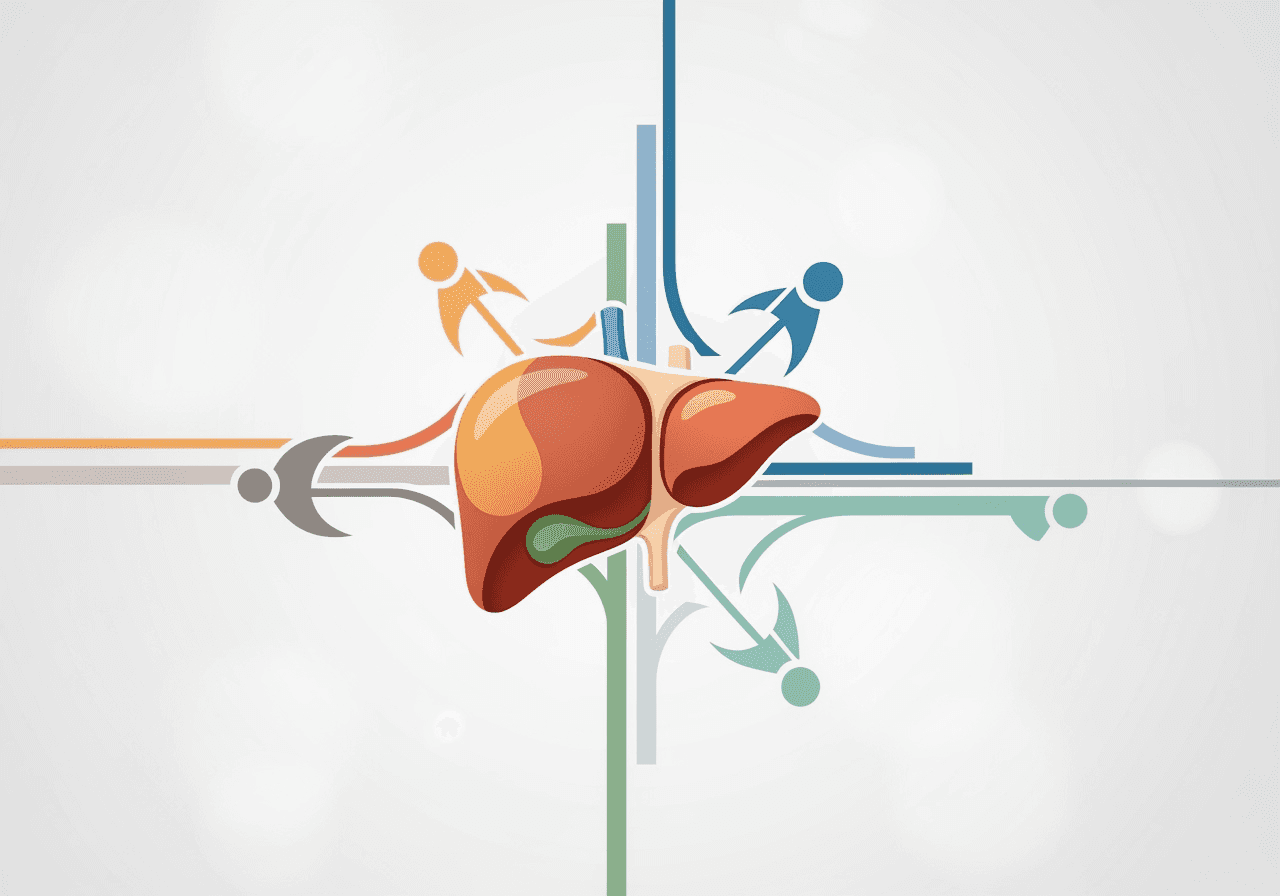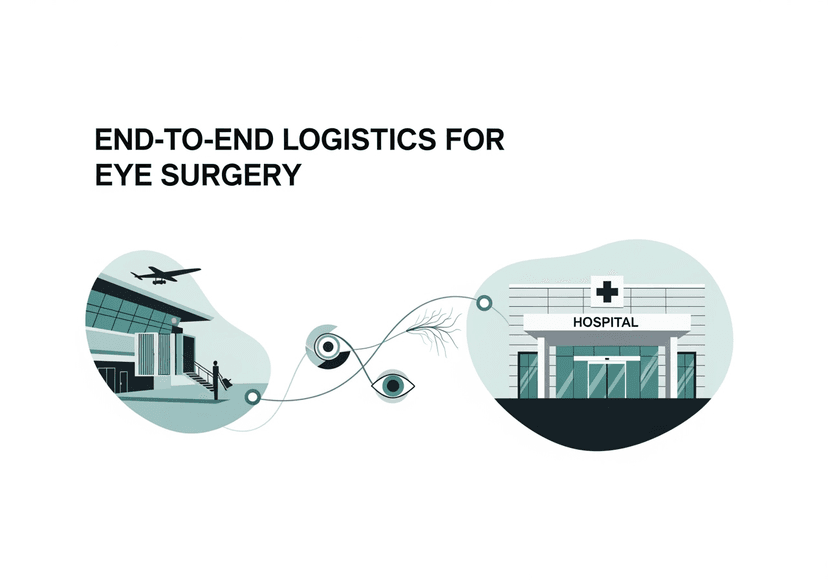
Role of Multidisciplinary Teams in Liver Transplant
15 Oct, 2025
 Healthtrip
Healthtrip- Where Multidisciplinary Teams are Essential in Liver Transplant Programs
- Why a Multidisciplinary Approach is Crucial for Liver Transplant Success
- Who are the Key Members of a Liver Transplant Multidisciplinary Team?
- How Multidisciplinary Teams Collaborate in the Liver Transplant Process
- Examples of Multidisciplinary Team Benefits in Liver Transplant at Vejthani Hospital, Fortis Memorial Research Institute, Gurgaon, and Saudi German Hospital Cairo, Egypt.
- Challenges and Solutions in Maintaining an Effective Multidisciplinary Team
- Conclusion: The Future of Liver Transplant Relies on Multidisciplinary Excellence
The Core Team: Expertise at Every Turn
The liver transplant team is composed of highly skilled specialists, each responsible for specific aspects of patient care. Hepatologists are the gatekeepers, diagnosing liver diseases, assessing the patient's suitability for transplant, and managing their pre- and post-transplant care. Surgeons, with their deft hands and surgical skills, perform the transplant operation. Transplant nurses are the patient's advocates, providing hands-on care, emotional support, and education every step of the way. Radiologists, interventional radiologists, and pathologists also play critical roles in diagnosis and treatment planning. For example, you can find expert surgeons at hospitals like Memorial Sisli Hospital or Vejthani Hospital. The collaborative spirit ensures that patients receive personalized treatment plans tailored to their unique needs, maximizing the chances of a successful transplant and long-term health. The key here is the constant communication, a shared understanding of the patient's condition and the common goal of the best possible outcome.
Most popular procedures in India
Beyond the Operating Room: The Extended Team
Liver transplantation isn't just about the surgery; it's about the whole person. That's why the multidisciplinary team extends beyond the operating room to include professionals who address the patient's emotional, social, and nutritional needs. Social workers provide counseling and support, helping patients and their families navigate the emotional challenges of transplantation. Dietitians develop personalized nutrition plans to optimize the patient's health before and after the procedure. Pharmacists ensure that medications are managed safely and effectively. Physical therapists assist with rehabilitation, helping patients regain strength and mobility. Psychiatrists or psychologists address any mental health concerns that may arise. Hospitals like NMC Specialty Hospital, Abu Dhabi, and Saudi German Hospital Cairo, Egypt, feature extended teams which allow them to provide truly holistic and compassionate care that extends far beyond the surgical procedure itself. This extended care is vital for ensuring a smooth recovery.
Wellness Treatments
Give yourself the time to relax
Lowest Prices Guaranteed!

Lowest Prices Guaranteed!
Communication is Key: A Well-Orchestrated Symphony
The effectiveness of a multidisciplinary team hinges on clear and consistent communication. Regular team meetings, where each member shares their observations and insights, are crucial for developing a comprehensive understanding of the patient's condition. This collaborative approach ensures that all aspects of the patient's care are considered when making decisions. Open communication also extends to the patient and their family, empowering them to actively participate in their care. Whether it's choosing the right hospital like Fortis Hospital, Noida or understanding potential risks and benefits, patients deserve to be fully informed and involved. Transparency fosters trust, builds confidence, and ultimately leads to better outcomes. Effective communication helps ensure the team stays on the same page during and after the procedure.
Improved Outcomes: The Proof is in the Pudding
Studies have consistently shown that multidisciplinary teams improve outcomes for liver transplant patients. These teams are associated with reduced complications, shorter hospital stays, and improved survival rates. By addressing all aspects of the patient's health, multidisciplinary teams can optimize their physical and emotional well-being, leading to better overall results. Improved patient satisfaction is another significant benefit, as patients feel more supported and cared for throughout their transplant journey. With Healthtrip, you can find hospitals such as Quironsalud Hospital Murcia where multidisciplinary teams are used to provide the best care possible. Furthermore, the comprehensive approach of interdisciplinary teams has been shown to improve long-term adherence to immunosuppressant medications, reducing the risk of organ rejection. All of this adds up to more than simply a successful operation; it amounts to a greatly improved quality of life.
Healthtrip: Your Partner in Navigating Liver Transplantation
Navigating the world of liver transplantation can be overwhelming, but you don't have to do it alone. Healthtrip is here to guide you every step of the way, connecting you with leading hospitals and experienced multidisciplinary teams worldwide. We understand that liver transplantation is a complex medical journey, and our goal is to provide you with the information and support you need to make informed decisions about your care. Whether you're seeking a second opinion, exploring treatment options, or need help navigating the logistics of international travel for treatment at places like Yanhee International Hospital or Bangkok Hospital, Healthtrip is your trusted partner. We help you find the right team and the right place so you can focus on what matters most: your health and well-being. Think of Healthtrip as your personal navigator, guiding you through the complexities of the medical landscape to reach the destination of optimal health.
Where Multidisciplinary Teams are Essential in Liver Transplant Programs
Liver transplantation is undoubtedly one of the most complex and demanding procedures in modern medicine, far beyond a mere surgical feat. It's a symphony of coordinated expertise, a delicate interplay of medical disciplines working in perfect harmony. That’s why multidisciplinary teams are not just beneficial, but absolutely essential in liver transplant programs. Think of it as assembling the Avengers of healthcare – each member possessing unique superpowers, all united by a common goal: saving a life. These teams are crucial in hospitals dealing with the intricacies of pre-transplant evaluation, surgery, and post-transplant care, ensuring every aspect of the patient's journey is meticulously managed. For instance, leading centers like the Vejthani Hospital, Fortis Memorial Research Institute, Gurgaon, and Saudi German Hospital Cairo, Egypt, recognize this and have structured their liver transplant programs around this collaborative model. Healthtrip connects patients with such advanced facilities, ensuring access to comprehensive care that leverages the expertise of diverse specialists. A holistic approach encompassing medical, surgical, psychological, and social support is the cornerstone of successful liver transplantation, which is precisely what a multidisciplinary team brings to the table. It's not merely about replacing an organ; it's about rebuilding a life, and that requires a village – a well-coordinated, highly skilled medical village.
The Broad Spectrum of Liver Disease
The very nature of liver diseases demands a multidisciplinary approach. Liver diseases, encompassing conditions like cirrhosis, hepatitis, and liver cancer, often present with a complex web of symptoms and complications. Managing these complexities requires the input of specialists from diverse fields. Consider the patient with cirrhosis awaiting a transplant. They may be battling ascites (fluid buildup in the abdomen), hepatic encephalopathy (brain dysfunction due to liver failure), and esophageal varices (enlarged veins in the esophagus that can bleed). A hepatologist is crucial for managing the underlying liver disease, but a gastroenterologist might be needed to address the varices, a nephrologist to manage kidney function affected by liver failure, and a dietician to optimize the patient's nutritional status. This intricate orchestration of care underscores why multidisciplinary teams are indispensable. Each specialist brings their unique perspective to the table, ensuring that all aspects of the patient's condition are addressed comprehensively. Healthtrip understands that patients seeking liver transplants often face a daunting array of medical challenges, and that's why we connect them with hospitals that prioritize teamwork and collaboration.
Comprehensive Patient Assessment: A Team Effort
The evaluation process alone is where a multidisciplinary approach shines. Determining a patient's suitability for liver transplantation isn't a simple yes or no decision. It requires a thorough assessment of their overall health, the severity of their liver disease, and their psychological readiness for such a life-altering procedure. This assessment involves a hepatologist, a transplant surgeon, a psychiatrist or psychologist, a social worker, and a financial counselor. The hepatologist evaluates the severity of the liver disease and determines if the patient meets the criteria for transplantation. The surgeon assesses the patient's surgical risk and ensures they are physically fit for the operation. The psychiatrist or psychologist evaluates the patient's mental and emotional state, assessing their ability to cope with the stress of transplantation and the lifelong commitment to immunosuppressant medications. The social worker assesses the patient's social support system and their ability to adhere to the post-transplant care plan. The financial counselor helps the patient navigate the often-complex world of insurance coverage and financial assistance programs. The collective insights of these professionals forms a holistic picture, guiding the transplant team in making the most informed decision possible. By utilizing Healthtrip, you can discover facilities that offer such exhaustive pre-transplant evaluations. It's about more than just medical data; it's about understanding the whole person.
Why a Multidisciplinary Approach is Crucial for Liver Transplant Success
The success of a liver transplant hinges on a multitude of interconnected factors, extending far beyond the surgeon's skill in the operating room. A multidisciplinary approach acts as the linchpin, holding together the various aspects of care and ensuring that each element contributes positively towards the ultimate goal: a healthy and thriving patient. Imagine a complex puzzle - each specialist holds a unique piece, and only when they collaborate effectively can they reveal the complete picture and ensure lasting success. This holistic approach, where diverse experts pool their knowledge and skills, drastically improves patient outcomes and overall satisfaction. Healthtrip recognizes the vital role of this collaborative model and connects patients with hospitals like Fortis Memorial Research Institute, Gurgaon, and Saudi German Hospital Cairo, Egypt, known for their integrated, team-based transplant programs. These programs acknowledge that optimal patient care requires not just medical expertise, but also psychological, social, and nutritional support, all seamlessly coordinated. It's about building a safety net of expertise around the patient, ensuring that no aspect of their well-being is overlooked.
Improved Patient Outcomes: A Tangible Result
The evidence overwhelmingly supports the notion that multidisciplinary teams lead to improved patient outcomes in liver transplantation. Studies have shown that patients managed by these teams experience fewer complications, shorter hospital stays, and higher survival rates. Why? Because a team approach allows for early detection and management of potential problems. For instance, a dedicated transplant pharmacist can ensure that patients receive the correct dosages of immunosuppressant medications, minimizing the risk of rejection or infection. A specialized transplant nurse can provide comprehensive education to patients and their families, empowering them to actively participate in their care. A registered dietitian can optimize the patient's nutritional status, promoting wound healing and preventing muscle wasting. These proactive interventions, made possible by the collaborative efforts of a multidisciplinary team, significantly contribute to improved patient outcomes. Healthtrip prioritizes hospitals with strong multidisciplinary teams, because we are committed to connecting patients with the best possible care, and better outcomes translate to healthier, happier lives. The synergy created by these teams is more than just the sum of its parts; it's a catalyst for superior patient care.
Enhanced Communication and Coordination: Eliminating Silos
Effective communication and coordination are the bedrock of a successful multidisciplinary team. When healthcare professionals from different disciplines work in silos, information can get lost, leading to errors and delays in care. A well-functioning multidisciplinary team fosters open communication, ensuring that all members are aware of the patient's current status, treatment plan, and any potential concerns. Regular team meetings, shared electronic medical records, and clear lines of communication are essential for promoting coordination. Imagine a relay race – each team member must seamlessly pass the baton to the next, without dropping it or losing momentum. Similarly, a multidisciplinary team must ensure a smooth transition of care between different specialists, preventing any gaps or inconsistencies in treatment. This level of coordination minimizes the risk of medical errors and ensures that patients receive timely and appropriate care. Healthtrip understands the importance of seamless communication in delivering quality healthcare and connects patients with hospitals that prioritize team-based care and open communication channels. It’s about ensuring everyone is on the same page, working towards the same goal: the patient's well-being.
Personalized Treatment Plans: Tailoring Care to Individual Needs
Every patient is unique, with their own set of medical history, lifestyle, and preferences. A multidisciplinary approach allows for the creation of personalized treatment plans that are tailored to the individual needs of each patient. By incorporating the perspectives of different specialists, the transplant team can develop a comprehensive plan that addresses all aspects of the patient's health. This personalized approach extends beyond the medical realm. It also considers the patient's psychological and social needs, ensuring that they receive the support they need to cope with the challenges of transplantation. For example, a patient who is struggling with anxiety or depression may benefit from counseling or support groups. A patient who lacks adequate social support may need assistance with transportation, housing, or home care. A multidisciplinary team can identify these needs and connect patients with the appropriate resources. This personalized approach not only improves patient outcomes but also enhances their overall satisfaction with the transplant process. When you connect with a hospital via Healthtrip, you're gaining access to a team that sees you as an individual, not just a case, ensuring a transplant journey that is designed around your specific needs.
Who are the Key Members of a Liver Transplant Multidisciplinary Team?
A successful liver transplant program relies on the seamless collaboration of a diverse group of highly specialized healthcare professionals. Each member brings unique expertise and a distinct perspective, forming a cohesive unit dedicated to the patient's well-being. It’s like a finely tuned orchestra, where each instrument plays a vital role in creating a harmonious symphony. Identifying these key players is crucial to understanding the complexity and comprehensive nature of liver transplant care. Healthtrip recognizes the importance of this team approach and strives to connect patients with hospitals like Vejthani Hospital, Fortis Memorial Research Institute, Gurgaon, and Saudi German Hospital Cairo, Egypt, that have established robust multidisciplinary teams. These hospitals understand that a team approach is not just a "nice to have", but a "must-have" for delivering exceptional transplant care. It's about creating a network of support where every aspect of the patient's journey is carefully considered and managed by experts in their respective fields.
Hepatologist: The Liver Disease Expert
The hepatologist is the quarterback of the liver transplant team, specializing in the diagnosis, treatment, and management of liver diseases. They are instrumental in determining a patient's eligibility for transplantation, assessing the severity of their liver disease, and managing any complications that may arise before, during, and after the transplant. The hepatologist works closely with other members of the team to develop a comprehensive treatment plan that addresses the patient's specific needs. They will often be the primary point of contact for the patient and their family, providing education, support, and guidance throughout the transplant process. Their deep understanding of the intricacies of liver disease makes them invaluable in navigating the complexities of the patient's condition. Healthtrip ensures that patients are connected with hospitals where experienced and dedicated hepatologists are integral members of the transplant team. It’s about having a knowledgeable guide who can expertly steer you through the complex landscape of liver disease and transplantation.
Transplant Surgeon: The Skilled Craftsman
The transplant surgeon is the artist, the masterful craftsman who performs the delicate and complex surgical procedure of removing the diseased liver and replacing it with a healthy donor organ. They are responsible for evaluating the patient's surgical risk, performing the transplant surgery, and managing any surgical complications that may arise. The transplant surgeon works closely with the hepatologist to determine the optimal timing for the transplant and to ensure that the patient is in the best possible condition for surgery. Their exceptional surgical skills, meticulous attention to detail, and ability to handle complex situations are vital for a successful transplant outcome. Healthtrip partners with hospitals recognized for their highly skilled and experienced transplant surgeons, ensuring that patients receive the best possible surgical care. It's about entrusting your life to hands that are not only skilled but also deeply committed to your well-being.
Transplant Coordinator: The Orchestrator of Care
The transplant coordinator is the glue that holds the entire team together, acting as the central point of contact for the patient, their family, and all members of the transplant team. They are responsible for coordinating all aspects of the patient's care, from the initial evaluation through the post-transplant period. This includes scheduling appointments, managing medical records, facilitating communication between team members, and providing education and support to the patient and their family. The transplant coordinator is often the first person a patient speaks with and serves as a constant source of information, guidance, and encouragement throughout the transplant journey. Their organizational skills, empathy, and ability to navigate the complexities of the transplant process are essential for ensuring a smooth and seamless experience for the patient. Healthtrip understands the vital role of the transplant coordinator and connects patients with hospitals that have dedicated and compassionate coordinators who are committed to providing exceptional support. It's about having a reliable advocate who can guide you through every step of the transplant process, making it less daunting and more manageable.
Also Read:
How Multidisciplinary Teams Collaborate in the Liver Transplant Process
The liver transplant process is a complex journey, a marathon, not a sprint! It requires meticulous coordination and seamless communication between various specialists. Think of the multidisciplinary team as a well-oiled machine, each cog essential for smooth operation. The collaboration begins even before the transplant, with a comprehensive evaluation of the patient's overall health. This involves assessments from hepatologists, surgeons, radiologists, psychologists, and social workers. Imagine the hepatologist meticulously reviewing the patient's liver function tests, while the surgeon visualizes the intricacies of the transplant procedure through advanced imaging. The psychologist assesses the patient's emotional readiness, ensuring they are mentally prepared for the challenges ahead. The social worker navigates the complexities of insurance and financial support, alleviating some of the burden on the patient and their family. It's a holistic approach that considers every aspect of the patient's well-being.
Once a patient is deemed a suitable candidate for transplant, the multidisciplinary team works together to create a personalized treatment plan. This plan addresses not only the liver disease but also any other underlying health conditions. For instance, a patient with diabetes may need adjustments to their medication regimen, while a patient with heart disease may require cardiac clearance before the transplant. The anesthesiologist plays a crucial role in optimizing the patient's condition for surgery, ensuring their safety throughout the procedure. During the transplant itself, the surgical team works in concert, each member with a specific role to play. Think of it as an orchestra, with the surgeon as the conductor, guiding the team through the intricate steps of the operation. After the transplant, the multidisciplinary team continues to provide ongoing care and support, monitoring the patient for complications and adjusting medications as needed. The team also provides education and counseling to help the patient adjust to their new life after transplant. It's a collaborative effort, driven by a shared commitment to providing the best possible care for the patient.
Post-transplant care is just as crucial, if not more so, than pre-operative assessments and the surgery itself. This is where the team truly shines, monitoring for rejection, managing immunosuppression, and addressing any infections or complications that may arise. The dietician provides guidance on a healthy diet to support liver function and overall well-being. The physical therapist helps the patient regain strength and mobility. The pharmacist ensures that the patient understands their medications and potential side effects. And let's not forget the crucial role of the transplant coordinator, the glue that holds the team together, ensuring that everyone is on the same page and that the patient's needs are met. It's a symphony of coordinated care, all orchestrated to give the patient the best chance at a healthy and fulfilling life after their liver transplant. Healthtrip understands the importance of this comprehensive care and can assist patients in finding hospitals and specialists that offer this level of multidisciplinary expertise.
Also Read:
Examples of Multidisciplinary Team Benefits in Liver Transplant at Vejthani Hospital, Fortis Memorial Research Institute, Gurgaon, and Saudi German Hospital Cairo, Egypt.
Let's dive into some real-world examples of how multidisciplinary teams are making a significant difference in liver transplant outcomes. First, consider Vejthani Hospital in Bangkok, Thailand. They've cultivated a strong reputation for international patients seeking advanced medical care. Their liver transplant program is bolstered by a team that includes transplant surgeons, hepatologists specializing in pre- and post-operative care, infectious disease specialists, and dedicated nurses. This collaborative approach has led to improved patient survival rates and a smoother recovery process, attracting patients globally.
Next up, we have Fortis Memorial Research Institute in Gurgaon, India. This hospital emphasizes personalized care plans developed by a multidisciplinary team. Imagine a patient arriving from overseas, feeling overwhelmed by the process. At Fortis, the team, comprised of transplant surgeons, experienced hepatologists, radiologists specializing in liver imaging, and dedicated rehabilitation specialists, works together to create a plan tailored to their specific needs. They tackle everything from pre-transplant nutritional support to post-transplant physiotherapy, ensuring a holistic approach to recovery. This coordinated effort helps patients feel supported and confident throughout their journey.
Finally, let's look at the Saudi German Hospital Cairo, Egypt. This hospital is increasingly becoming a destination for liver transplants in the region. Their multidisciplinary team includes not only transplant surgeons and hepatologists, but also specialized nurses, psychologists, and social workers. The psychologist is so important, someone who assesses patients mental preparedness, helping patients cope with the emotional challenges of the transplant journey. The social worker provides assistance with logistical and financial hurdles, easing the burden on families. This comprehensive support system contributes to improved patient satisfaction and successful outcomes, making Saudi German Hospital Cairo a preferred choice for patients seeking quality liver transplant care in Egypt. Healthtrip can help you connect with these hospitals and explore the options available to you, ensuring you receive the best possible care.
Also Read:
Challenges and Solutions in Maintaining an Effective Multidisciplinary Team
Building and maintaining a high-functioning multidisciplinary team isn't always sunshine and rainbows; it comes with its own set of challenges. Effective communication can be a significant hurdle. Imagine a scenario where a critical lab result isn't promptly communicated, potentially delaying crucial treatment decisions. To overcome this, implementing standardized communication protocols, such as daily team huddles or secure messaging platforms, can ensure everyone is on the same page. Another challenge is navigating differing professional opinions and priorities. Each specialist brings their unique perspective, which can sometimes lead to disagreements. Establishing clear leadership roles and fostering a culture of respect and open dialogue can help resolve conflicts constructively. Regular interdisciplinary meetings where each team member is encouraged to share their views can promote understanding and collaboration.
Resource limitations, particularly in understaffed or underfunded facilities, can also strain teamwork. When specialists are stretched thin, it can be difficult to find the time for collaborative meetings and comprehensive patient reviews. Advocating for adequate staffing levels and exploring innovative solutions like telemedicine or shared resources can help alleviate these pressures. Furthermore, maintaining team cohesion in the face of high stress and emotional demands can be a real struggle. Liver transplant programs are inherently demanding, and the emotional toll on healthcare providers can be significant. Implementing strategies to support team well-being, such as regular debriefing sessions, stress management workshops, and access to mental health resources, is essential for preventing burnout and maintaining a positive work environment. Healthtrip acknowledges these challenges and strives to connect patients with institutions that prioritize team well-being and collaborative care.
Finally, ensuring continuous professional development and training for all team members is crucial for maintaining expertise and staying abreast of the latest advancements in liver transplantation. This includes providing opportunities for attending conferences, participating in research, and engaging in ongoing education programs. By investing in the growth and development of its members, the multidisciplinary team can enhance its collective knowledge and skills, ultimately leading to improved patient outcomes. Overcoming these challenges requires a proactive and ongoing commitment to fostering a collaborative and supportive team environment. It's about recognizing that the success of the liver transplant program depends not only on individual expertise but also on the ability of the team to work together seamlessly and effectively.
Also Read:
Conclusion: The Future of Liver Transplant Relies on Multidisciplinary Excellence
In conclusion, the future of liver transplantation is inextricably linked to the continued development and refinement of multidisciplinary teams. As medical knowledge expands and technology advances, the complexity of liver transplant care will only increase. This necessitates a collaborative approach where specialists from various disciplines work together seamlessly to provide comprehensive and individualized care. The benefits of this approach are undeniable: improved patient outcomes, reduced complications, and enhanced quality of life. Imagine a future where liver transplant programs are characterized by seamless communication, shared decision-making, and a relentless focus on patient-centered care. This is the vision that drives Healthtrip, connecting patients with leading transplant centers around the world that embrace multidisciplinary excellence.
As patients increasingly seek medical care across borders, the ability to access institutions with robust multidisciplinary teams becomes even more critical. Healthtrip plays a vital role in facilitating this access, providing patients with information and resources to make informed decisions about their care. Whether you're considering a liver transplant at Vejthani Hospital, Fortis Memorial Research Institute, Gurgaon, Saudi German Hospital Cairo, Egypt, or another leading center, understanding the structure and function of the multidisciplinary team is essential. It's about ensuring that you receive the best possible care from a team of experts who are working together to achieve a common goal: your health and well-being. The future of liver transplantation is bright, and it's powered by the collective expertise and unwavering dedication of multidisciplinary teams.
Ultimately, the success of a liver transplant program hinges not only on the skill of the surgeons or the expertise of the hepatologists but on the effectiveness of the entire team. It's about creating a culture of collaboration, communication, and continuous improvement. As we move forward, it's imperative that we continue to invest in the development and support of multidisciplinary teams, ensuring that patients receive the best possible care at every stage of their transplant journey. Healthtrip is committed to being a part of this future, empowering patients to navigate the complexities of liver transplantation and access the best multidisciplinary care available worldwide. By working together, we can transform the lives of countless individuals affected by liver disease.
Also Read:
Related Blogs

How Healthtrip Ensures Quality & Safety in Eye Surgery Procedures
Detailed guide on eye surgery, featuring doctors, hospitals, risks, recovery,

End-to-End Logistics for Eye Surgery with Healthtrip's Support
Detailed guide on eye surgery, featuring doctors, hospitals, risks, recovery,

Healthtrip's Care Coordinators: Your Support During Eye Surgery
Detailed guide on eye surgery, featuring doctors, hospitals, risks, recovery,

Top 5 Indian Hospitals for Eye Surgery
Detailed guide on eye surgery, featuring doctors, hospitals, risks, recovery,

Post-Eye Surgery Diet and Lifestyle Tips
Detailed guide on eye surgery, featuring doctors, hospitals, risks, recovery,

Common Risks in Eye Surgery and How Healthtrip Manages Them
Detailed guide on eye surgery, featuring doctors, hospitals, risks, recovery,










